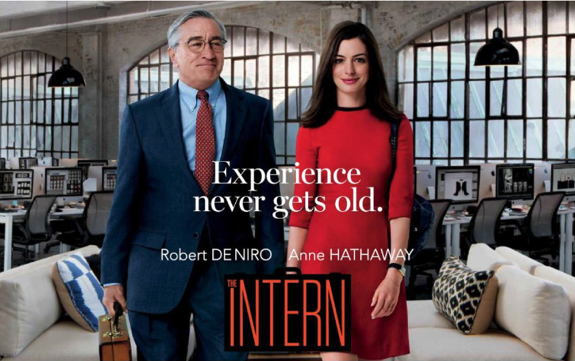
In the movie The Intern, a young HR assistant sits across from Robert DeNiro – who is clearly 70’ish – and cheekily says, “now I’m going to ask you one of our more telling questions for all of our interns.” Pause.
“Where do you see yourself in ten years?” he asks.
And there you have it. For the first time in history, there are now five generations working together. None of whom, really understands the other.
Yet somehow, they are expected to not only collaborate together, but learn new technologies and skills in the same way, from the same perspective.
When Generations Collide
It may surprise you to realise that the oldest Millennials are now 40. When did that happen?
Over the past decade, careers have become more dynamic and complex. People are living longer, with the rapid pace of change in the workplace resulting in workers needing to reinvent themselves multiple times throughout their careers.
Key to this, has been the role of older generations of workers in the workplace. And despite the shocking juxtaposition of the 40 year old Millennial – there are still Baby Boomers and Traditionalists amongst us (aged 57+) looking to leave a legacy.
So, how can organisations lead these seemingly disparately motivated generations of employees to maximise their knowledge and capabilities – to ultimately drive organisational performance?
We looked to the theory behind generational differences and generational personality.
When Jon Tota, founder and evangelist of the Rockstar Learning System, interviewed the authors of When Generations Collide for his Learning Life podcast, they observed some distinct needs amongst the most dominant generations in the workplace right now: Millennials (now aged 25-40) and Gen Z (aged 9-24).
And what about Generation X (aged 41-56) who are generally passing the management baton and mentoring Millennials to be the next generation of managers?
David and Jonah Stillman – a father and son duo, are generational researchers, authors and consultants to companies like Virgin and the NFL, on how to leverage the respective generational differences and strengths in the workplace.
Some of their data and insights might draw a cynical smile.
They postulate that Generation X is trying to prove themselves constantly, yet dislike the image of being overly ambitious, disrespectful and irreverent.
They also observe that companies need to sort out a strategy for baby Boomers and Gen X’ers to make sure they’re revitalising their careers as they’ve not plateau’d.
As for the much-hyped Millennial generation, their next career stage is as front line managers, training and mentoring Gen Z.
However, unlike Gen Z, Millennials love to think in groups, and finding cause/purpose in our jobs, whereas 79% of Z’s say that if you want something done, do it yourself.
“Some of our biggest collisions are between those two groups.” – David Stillman, author of When Generations Collide
“People aren’t putting an emphasis on Gen Z and Millennials working together,” says Stillman, “we talk about Millennials being natural born collaborators. Gen Z? Not so much – they’re much more independent.”
A shrinking gap in generational differences
According to Deloitte, it’s the Millennial generation’s views and expectations that originally pushed organisations to focus on generation as a way of understanding the workforce.
Ironically, that understanding is now leading many to challenge these attributes as an oversimplification – and there is now a shift away from segmenting by generation.
So why is generation becoming less relevant as a way to understand the workforce? Particularly, in light of the fact that 70% of organisations say leading multi-generational workforces is critical.
The starting point is that careers have become more dynamic and complex, loosening the historic correlation between age and career progression.
“70% of organisations say leading multi-generational workforces is important or very important for their success.” – Deloitte’s The Longevity Dividend: Work in an era of 100-year lives
Rapid technological and organisational change is driving workers to reinvent themselves multiple times throughout their working lives; at the same time, the broader business culture has shifted to make it acceptable, sometimes even desirable, to promote younger individuals into leadership positions.
The upshot is that 65-year-old interns can today be found working side by side with 25-year-old managers, calling into question the assumption that age is a reasonable proxy for understanding people’s workplace challenges and needs.
Hence, the concept of “Perennials”. Coined by Gina Pell, they’re an ‘ever-blooming’ group of people of all ages, undefined by their generation and who continue to push up against their growing edge by transcending stereotypes, and by making connections with each other and the world around them.
Evolving the learning model to work for Perennials
Everyone uses Zoom for work, and watches Netflix for play – right?
In the context of engaging the Perennials in your organisation, it makes sense for organisations to adopt more flexible, user-driven / generated models and systems for learning and development.
Learning Systems, as Craig Weiss recently pointed out, is an umbrella name which is no longer particularly relevant.
The goal of the Learning System in the current context, is to make the learning path much more individualised, through user driven and user generated platforms that enable search, video, events channels and peer-to-peer learning that’s easy to share across the organisation.
As Jon Tota said in his introduction to the Rockstar Learning Platform, “A lot of today’s instructor led training is happening virtually by Zoom and WebX, which are great tools – but they weren’t really designed to do that, and that’s what we really designed this platform to do.”
“The platform must blend live events with on-demand, when context matters, and when getting credit for training, it’s here too,” he adds.
Along with this, of course must co-exist brand new solutions for assessment gaps and recommended courses of development to take workers to the next level.
“There’s a hole in my life and I need to fill it”
By understanding more deeply, the increasingly individualistic and independent worker – particularly in our virtual world – organisations can deliver on workers’ individual expectations.
According to Deloitte, a post generational approach to talent strategies that are more meaningful to workers’ needs and expectations will pay ongoing dividends in enhanced engagement and performance.
As DeNiro’s character Ben Whittaker said, “retirement is an ongoing, relentless effort in creativity. You can try yoga, take some classes in Mandarin. Believe me, I’ve tried everything. I just know there’s a hole in my life and I need to fill it … soon.”
Work life is long, but it’s also short, and becoming the oldest intern can creep up on you. Make learning at work a worthwhile experience for everyone in your organisation.
Find out more about The Rockstar Learning Platform – the experience your workers demand. Contact the team at ITC Learning.
